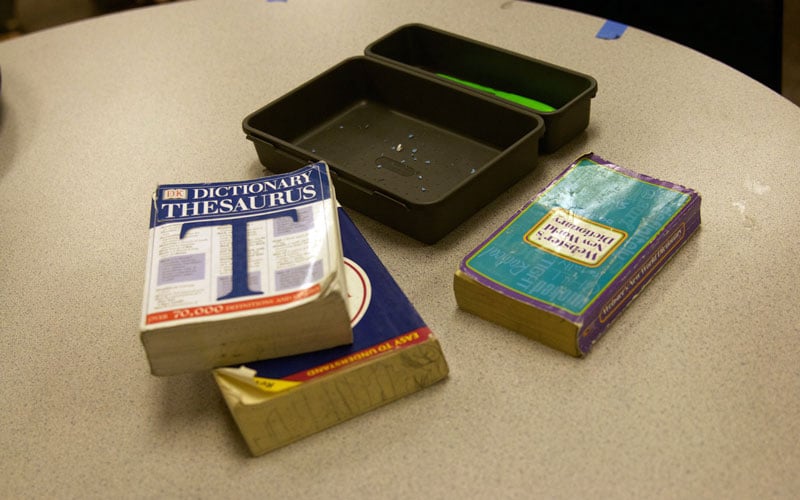The dictionaries in the language arts classrooms at Sunnyslope Elementary School carry the wear-and-tear of some 10 years, but replacements are coming soon, thanks to a new ally: GoFundMe.
With classroom expenses often coming out of their own pockets, many Arizona teachers are turning to online crowd-funding.
“People have donated $10, $20. It’s made a huge difference,” said Jeni Vargas, an eighth grade language arts teacher at Sunnyslope.
Kendra Tollackson, a former Sunnyslope teacher, started the GoFundMe campaign on Oct. 1 in hopes of buying 90 new dictionaries.
It’s taken less than three weeks to raise $948 out of $953 goal.
Tollackson said new dictionaries would help the teachers uniformly teach word definitions. Most of the classroom’s current books come in different editions, so the definitions depend on which version a student is reading. And for a school that has 15 laptops for 180 students, online dictionaries aren’t an option.
“Passing around one phone that’s the teacher’s phone is not a solution,” Tollackson said.
Vargas also said dictionaries are spread thin during the AzMERIT writing test, which requires students to have access to a dictionary. She said there is one dictionary for every table of four middle school test takers.
Tollackson said part of the fundraising campaign’s motivation is simply to give brand new classroom materials to students of the Title I school. In order to identify as a Title I school, 40 percent of students must qualify for free lunch.
“Students are impacted by the quality of the things that they get in the classroom too,” she said. “When they see new dictionaries, I guarantee you they’ll be really excited.”
Tollackson joins a long list of Arizona teachers who have had success through online crowd-funding.
A search of the DonorsChoose teacher crowd-funding website shows about 600 ongoing fundraising campaigns in the state.
Sarah Genise, a sixth grade science teacher at the Title I San Tan Heights Elementary, raised $905 on GoFundMe to buy microscopes, beakers and other lab equipment. She said she normally spends around $1,600 per year out of her paycheck on school supplies, which makes online crowdfunding “incredibly helpful.” The majority of her colleagues do it, she said.
“It’s to the point where if you’re a teacher and you don’t have one of those pages, then everyone kind of looks at you and questions, ‘Well, why don’t you have this?'” she said.
Most of the donors were family and friends, she said.
Vargas said different schools face different funding challenges. Her son attends the Madison Elementary School District, whose latest fundraising campaign is aiming for $40,000. But at Sunnyslope there’s no active Parent Teachers Association supplying teachers’ needs.
“In some communities, the PTA is able to raise money on their behalf, but in low socioeconomic communities, fundraising is very challenging,” said Jennifer Johnson, executive director of the parent-teacher advocacy group Support Our Schools AZ.
Johnson said a problems for teachers in underprivileged areas is their students’ lack of home access to reading materials and computers.
“And so, more and more, the burden of really accelerating the students’ progress falls on the teachers, and that means they need a more diverse set of resources,” she said.
Claire Darby, a Sunnyslope seventh grade language arts teacher, said the problem isn’t with her district or her school’s funding decisions. For her, the issue is much larger.
“I don’t blame our school or the district or anything like that. I think it’s just [that] everybody’s in this situation,” she said.
Johnson said the problem lies within the state.
“I’m not sure that policy makers at the state level have a clear understanding of the match between what we’re asking teachers to accomplish, what we’re asking students to accomplish and the resources that they need to do that,” she said.
She said the state will either invest in education now or invest in unemployment, criminal justice and welfare systems later.
“It’s no secret that things are underfunded,” Tollackson said. “And I actually don’t know the answer to how to fix it, but we are really under resourced, and it plays out in classrooms everyday.”
